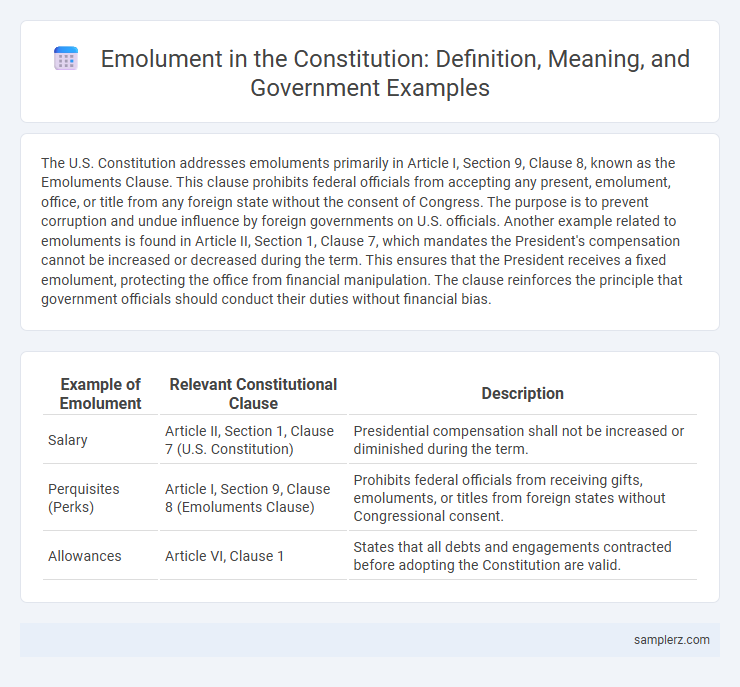The U.S. Constitution addresses emoluments primarily in Article I, Section 9, Clause 8, known as the Emoluments Clause. This clause prohibits federal officials from accepting any present, emolument, office, or title from any foreign state without the consent of Congress. The purpose is to prevent corruption and undue influence by foreign governments on U.S. officials. Another example related to emoluments is found in Article II, Section 1, Clause 7, which mandates the President's compensation cannot be increased or decreased during the term. This ensures that the President receives a fixed emolument, protecting the office from financial manipulation. The clause reinforces the principle that government officials should conduct their duties without financial bias.
Table of Comparison
| Example of Emolument | Relevant Constitutional Clause | Description |
|---|---|---|
| Salary | Article II, Section 1, Clause 7 (U.S. Constitution) | Presidential compensation shall not be increased or diminished during the term. |
| Perquisites (Perks) | Article I, Section 9, Clause 8 (Emoluments Clause) | Prohibits federal officials from receiving gifts, emoluments, or titles from foreign states without Congressional consent. |
| Allowances | Article VI, Clause 1 | States that all debts and engagements contracted before adopting the Constitution are valid. |
Definition of Emolument in the Constitutional Context
Emolument in the constitutional context refers to any profit, gain, or advantage received by a public official from holding office, including salaries, fees, and benefits. The U.S. Constitution's Emoluments Clause prohibits federal officials from accepting any present, emolument, office, or title from a foreign state without Congressional consent. This provision aims to prevent conflicts of interest and ensure public officials act in the national interest rather than for personal financial gain.
Historical Background of Emolument Clauses
The Emolument Clauses in the U.S. Constitution, specifically Article I, Section 9, Clause 8 and Article II, Section 1, Clause 7, were established to prevent corruption and foreign influence by restricting government officials from accepting gifts, payments, or titles from foreign states without Congressional consent. These provisions originated during the founding era, reflecting the Framers' intent to safeguard the integrity of the federal government following experiences with British colonial influence and to ensure loyalty to the newly formed republic. Historical interpretations emphasize these clauses as foundational measures to maintain transparency and accountability in public service.
Types of Emoluments Recognized by the Constitution
The Constitution recognizes several types of emoluments, including salaries, fees, allowances, and perquisites received by government officials. Article II, Section 27 explicitly limits the emoluments to fixed rates to prevent any additional compensation that could compromise public service integrity. These provisions ensure transparency and prevent conflicts of interest within the executive, legislative, and judicial branches.
Domestic Emoluments Clause: Presidential Compensation
The Domestic Emoluments Clause in the U.S. Constitution ensures that the President receives a fixed compensation that cannot be increased or decreased during their term, preventing any other emoluments from the federal or state governments. This clause, found in Article II, Section 1, Clause 7, prohibits the President from accepting any additional payments or gifts beyond their official salary. It safeguards the integrity of presidential compensation by avoiding conflicts of interest and undue influence.
Foreign Emoluments Clause: Preventing Foreign Influence
The Foreign Emoluments Clause, found in Article I, Section 9, Clause 8 of the U.S. Constitution, prohibits any federal official from accepting gifts, payments, or titles from foreign states without Congressional consent, aiming to prevent foreign influence in government decisions. This clause ensures that elected and appointed officials remain free from foreign corruption and undue influence by restricting foreign emoluments such as salaries, benefits, or honors. By enforcing these restrictions, the Constitution upholds government integrity and national security.
Notable Supreme Court Cases Involving Emoluments
The Constitution's Emoluments Clause, designed to prevent officials from receiving benefits outside their salary, has been central in cases such as *District of Columbia v. Trump* and *CREW v. Trump*. These Supreme Court cases focused on whether President Trump's business interests violated the clause by accepting payments from foreign governments. The rulings emphasized the importance of maintaining governmental integrity and preventing conflicts of interest inherent in emoluments.
Examples of Emolument Violations in U.S. History
Thomas Jefferson faced allegations of emolument violations related to his ownership of a distillery while in office, raising concerns about profiting from government position. More recently, President Donald Trump was scrutinized for potential emolument breaches due to his continued financial interests in the Trump Organization and foreign payments through his hotels. These examples underscore the constitutional imperative to prevent government officials from receiving undue benefits that might influence their official duties.
Emolument Protections for Federal and State Officials
The U.S. Constitution's Emoluments Clause prohibits federal officials from receiving gifts, payments, or titles from foreign states without congressional consent, ensuring protection against foreign influence. State officials are similarly restricted by various state constitutions and statutes that ban receiving emoluments from entities with interests in government decisions. These provisions maintain integrity by preventing conflicts of interest and promoting transparency across federal and state levels.
Congressional Role in Regulating Emoluments
The U.S. Constitution explicitly prohibits members of Congress from receiving emoluments, gifts, or titles from foreign states without Congressional consent under the Emoluments Clause. This provision ensures legislative oversight in regulating and preventing conflicts of interest among government officials. Congress plays a critical role in enforcing these restrictions to maintain the integrity of federal offices and uphold public trust.
Modern Interpretations and Controversies Around Emoluments
The U.S. Constitution's Emoluments Clause prohibits federal officials from receiving gifts or benefits from foreign states without Congressional consent, emphasizing the prevention of corruption and undue influence. Modern interpretations focus on whether indirect benefits, such as profits derived from officials' business interests linked to foreign entities, constitute emoluments, sparking legal debates that have led to high-profile lawsuits. Controversies around these interpretations highlight challenges in defining "emolument" amid evolving business practices and the globalization of political figures' financial holdings.

example of emolument in constitution Infographic
 samplerz.com
samplerz.com